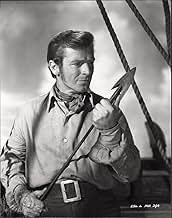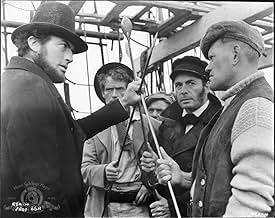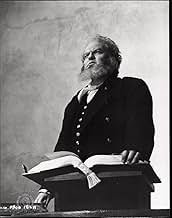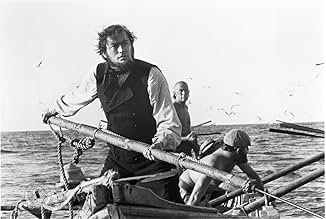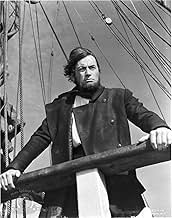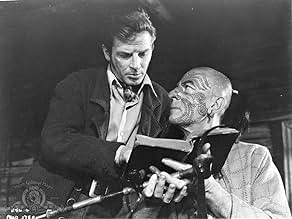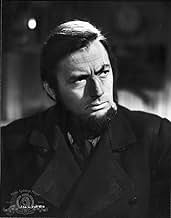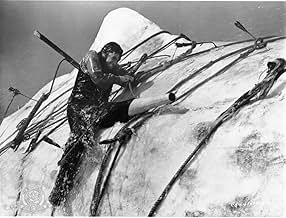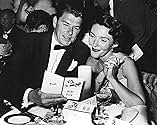Moby Dick
- 1956
- Tous publics
- 1h 56m
IMDb RATING
7.3/10
23K
YOUR RATING
The sole survivor of a lost whaling ship relates the tale of his captain's self-destructive obsession to hunt the white whale, Moby Dick.The sole survivor of a lost whaling ship relates the tale of his captain's self-destructive obsession to hunt the white whale, Moby Dick.The sole survivor of a lost whaling ship relates the tale of his captain's self-destructive obsession to hunt the white whale, Moby Dick.
- Awards
- 5 wins & 4 nominations total
Friedrich von Ledebur
- Queequeg
- (as Friedrich Ledebur)
Tamba Allen
- Pip
- (uncredited)
Featured reviews
In the 1960s English professors and film critics delighted in bashing this film. The professors took the line that the movie wasn't Melville, while the critics dismissed Peck's interpretation of Captain Ahab as "stiff." Neither view holds up well today.
Huston's "Moby Dick" isn't the whole book, but what film is? Though he doesn't give you the breadth or the depth, Huston does deliver much of the spirit and heart of the novel. The production values are splendid and the supporting players outstanding. No one can top Orson Welles as Father Mapple, but Leo Genn's Starbuck comes close. My only complaint is with Richard Basehart, who was a good actor but at 42 much too old for Ishmael, who I believe is in his early 20s. Stray thought - I wonder what James Dean would have done with Ishmael?
As for Peck, who else could have attempted this role in the mid-50s? John Wayne? Gary Cooper? Let's be serious. Sterling Hayden (who actually was quite a sailor) had the proper face and frame, but Hayden was never a box office draw and likely wasn't considered. More to the point, Peck was a much better actor. Though a bit young for Ahab, he certainly conveys both the man's insanity and his magnetism, which of course are inseparable. In so many films ("Twelve O'Clock High", "Pork Chop Hill", "The Guns of Navarone"), Peck was nothing if not a leader. Here he leads convincingly, which is essential, for Ahab is not Captain Quegg. In spite of everything Ahab's men do not mutiny, they follow him down, and with Peck in the role you accept it. Was he stiff? Well, try walking around with a pegleg. You'll probably feel a bit stiff yourself. Better to call Peck's Ahab rigid and unflinching, qualities that are central to the character. I have not seen Patrick Stewart's interpretation, but I doubt his Ahab achieves either Peck's demonic fury or his stone-hearted resolve.
There have been few better films of life at sea and few better interpretations of classic literature. "Moby Dick" is a treasure grown richer with age.
Huston's "Moby Dick" isn't the whole book, but what film is? Though he doesn't give you the breadth or the depth, Huston does deliver much of the spirit and heart of the novel. The production values are splendid and the supporting players outstanding. No one can top Orson Welles as Father Mapple, but Leo Genn's Starbuck comes close. My only complaint is with Richard Basehart, who was a good actor but at 42 much too old for Ishmael, who I believe is in his early 20s. Stray thought - I wonder what James Dean would have done with Ishmael?
As for Peck, who else could have attempted this role in the mid-50s? John Wayne? Gary Cooper? Let's be serious. Sterling Hayden (who actually was quite a sailor) had the proper face and frame, but Hayden was never a box office draw and likely wasn't considered. More to the point, Peck was a much better actor. Though a bit young for Ahab, he certainly conveys both the man's insanity and his magnetism, which of course are inseparable. In so many films ("Twelve O'Clock High", "Pork Chop Hill", "The Guns of Navarone"), Peck was nothing if not a leader. Here he leads convincingly, which is essential, for Ahab is not Captain Quegg. In spite of everything Ahab's men do not mutiny, they follow him down, and with Peck in the role you accept it. Was he stiff? Well, try walking around with a pegleg. You'll probably feel a bit stiff yourself. Better to call Peck's Ahab rigid and unflinching, qualities that are central to the character. I have not seen Patrick Stewart's interpretation, but I doubt his Ahab achieves either Peck's demonic fury or his stone-hearted resolve.
There have been few better films of life at sea and few better interpretations of classic literature. "Moby Dick" is a treasure grown richer with age.
"We are all killers, on land and on sea," wrote Herman Melville more than 100 years ago. But the artistic failure of a recent television adaptation of his greatest work shows that some are killers, too, on screen. Movie makers. Butchers. Their guts are now gorged with Moby Dick.
"Majestic" raved "TV Guide" about USA Network's production of Melville's book. Reading that review I had a fantasy where Captain Ahab, with his sublime limp, walks into the magazine's office, shoves director John Huston's 1956 film of Moby Dick into the VCR, points to the screen and defiantly exclaims:
"There's majesty for you . . . "
. . . in the faces of men. Huston's film benefits from its intelligent casting of the seamen. The actors in the recent production are just pretty-boy imports from Los Angeles, rabble-rousers lacking the dignity that is gained from a lifetime of duty. But that dignity is plainly visible on the rugged faces of the men in the earlier film. One rarely sees that anymore.
. . . in the faces of women, too. The images of the women suffering as they watch their men go off to sea are utterly devastating, they hold so much emotional depth, so much beauty. The attention to detail in Huston's film is striking: the hairs on the chins of the old women, the tired, thick-skinned expressions of the wives and widows, the heavy shawls covering their heads.
. . . in the performances. Over 40 years ago when Orson Welles gave his performance as Father Mapple (a role which only a person with a special kind of magnificence could successfully take on), Gregory Peck might have been busily preparing for his role as Captain Ahab in the same film. What a testament to Peck's stature as one of our leading actors that throughout his career he could play not only Captain Ahab but also, in the recent production, Father Mapple.
. . . in the color. Huston's film is in Technicolor, a technique which produced colors not even seen in nature. The sky is now blue now red now green. The water is brown, pink, gray. Colors blend. Colors clash. By comparison, how banal the colors of our post-Technicolor world!
. . . in the mouth. The seamen have the exquisite mouths of pipe-smokers. The upper lip tight and stiff after so many hours pulled down in the puff.
. . . in the eyes. My favorite scene is where Peck as Captain Ahab famously proclaims: "Speak not to me of blasphemy. I'd strike the sun if it insulted me." The lighting, the acting, everything here is superb. The camera is focused tightly on Peck's face. The stark appearance of his eyes -- the tense, black irises all surrounded by gleaming white -- seems to reveal the subtext of the story. His eyes electrify!
John Huston's film says more in its two hours than USA Network's says in four; it suggests a lot and explains little, whereas the latter tries to explain a lot but says nothing. A great film, it doesn't butcher Melville's Moby Dick but adds to its power.
"Majestic" raved "TV Guide" about USA Network's production of Melville's book. Reading that review I had a fantasy where Captain Ahab, with his sublime limp, walks into the magazine's office, shoves director John Huston's 1956 film of Moby Dick into the VCR, points to the screen and defiantly exclaims:
"There's majesty for you . . . "
. . . in the faces of men. Huston's film benefits from its intelligent casting of the seamen. The actors in the recent production are just pretty-boy imports from Los Angeles, rabble-rousers lacking the dignity that is gained from a lifetime of duty. But that dignity is plainly visible on the rugged faces of the men in the earlier film. One rarely sees that anymore.
. . . in the faces of women, too. The images of the women suffering as they watch their men go off to sea are utterly devastating, they hold so much emotional depth, so much beauty. The attention to detail in Huston's film is striking: the hairs on the chins of the old women, the tired, thick-skinned expressions of the wives and widows, the heavy shawls covering their heads.
. . . in the performances. Over 40 years ago when Orson Welles gave his performance as Father Mapple (a role which only a person with a special kind of magnificence could successfully take on), Gregory Peck might have been busily preparing for his role as Captain Ahab in the same film. What a testament to Peck's stature as one of our leading actors that throughout his career he could play not only Captain Ahab but also, in the recent production, Father Mapple.
. . . in the color. Huston's film is in Technicolor, a technique which produced colors not even seen in nature. The sky is now blue now red now green. The water is brown, pink, gray. Colors blend. Colors clash. By comparison, how banal the colors of our post-Technicolor world!
. . . in the mouth. The seamen have the exquisite mouths of pipe-smokers. The upper lip tight and stiff after so many hours pulled down in the puff.
. . . in the eyes. My favorite scene is where Peck as Captain Ahab famously proclaims: "Speak not to me of blasphemy. I'd strike the sun if it insulted me." The lighting, the acting, everything here is superb. The camera is focused tightly on Peck's face. The stark appearance of his eyes -- the tense, black irises all surrounded by gleaming white -- seems to reveal the subtext of the story. His eyes electrify!
John Huston's film says more in its two hours than USA Network's says in four; it suggests a lot and explains little, whereas the latter tries to explain a lot but says nothing. A great film, it doesn't butcher Melville's Moby Dick but adds to its power.
Some critics panned this pic when it came out - Peck too wooden, the script too cliched, etc, etc. Don't believe a word of it. I saw this one when I was 8 or 9, and for years I watched it every time it came on TV - even in B&W! Peck isn't wooden, he's intense and fascinating (my favorite scene: in his cabin, saying to Starbuck, "That bed is a coffin"). The language may sound stilted, but it's MELVILLE'S, and the cast sink into it with conviction.
Some critic (I don't know which) has said that Moby Dick (the book) is an "uncomfortable masterpiece" - or something like that - meaning that it's a hard pill to swallow. The movie is bound to be a hard pill for many viewers as well. But that's their loss. Huston's movie is a great big powerful thing - you believe in Peck's crazy passion, in Starbuck's gentleness, in Ishmael and Quequeg's bond, in the evil of the whale, even.
Another favorite sequence: the Pequot becalmed, the crew lying about under the intense sun, slowly going crazy. The climactic chase is superb and thrilling, of course; what it all adds up to is a film about the elements, and our relationship to them. The whale is just the biggest of a whole slew that constantly threaten to destroy us. Nature, our natures - all the things we fight against with our intelligence, that threaten to engulf us.
Beautiful film, one of Huston's best. I find the analogy with Hitler/Nazis in an earlier comment very interesting. Another would be with an earlier Huston film, The Treasure of the Sierra Madre - another film about people taking terrible chances for reasons that don't stand up to a lot of examination, whose biggest obstacle turns out to be themselves. By the way, will someone please rerelease Moby Dick in a restored version so we can get a really good look at all that glorious Technicolor?
Some critic (I don't know which) has said that Moby Dick (the book) is an "uncomfortable masterpiece" - or something like that - meaning that it's a hard pill to swallow. The movie is bound to be a hard pill for many viewers as well. But that's their loss. Huston's movie is a great big powerful thing - you believe in Peck's crazy passion, in Starbuck's gentleness, in Ishmael and Quequeg's bond, in the evil of the whale, even.
Another favorite sequence: the Pequot becalmed, the crew lying about under the intense sun, slowly going crazy. The climactic chase is superb and thrilling, of course; what it all adds up to is a film about the elements, and our relationship to them. The whale is just the biggest of a whole slew that constantly threaten to destroy us. Nature, our natures - all the things we fight against with our intelligence, that threaten to engulf us.
Beautiful film, one of Huston's best. I find the analogy with Hitler/Nazis in an earlier comment very interesting. Another would be with an earlier Huston film, The Treasure of the Sierra Madre - another film about people taking terrible chances for reasons that don't stand up to a lot of examination, whose biggest obstacle turns out to be themselves. By the way, will someone please rerelease Moby Dick in a restored version so we can get a really good look at all that glorious Technicolor?
When John Huston was casting for Moby Dick he got to make it on condition that he get a name actor to play Ahab. He went to Gregory Peck who was surprised by the offer. Given his image and the roles he had played up to that time, Peck thought he'd be better cast as Starbuck the first mate. Nevertheless he agreed to do Ahab.
Peck got mixed reviews at the time, but over the course of 50 years his performance has gotten better with time. The film itself which was shot in Ireland and Wales has also aged well. It's a nice depiction of life on a whaling ship in the 1840s and the crew of the Pequod are nicely cast in their roles.
Orson Welles was set to do his own adaption of Moby Dick and canceled his film when he heard his friend John Huston was doing Moby Dick. Welles asked about doing Ahab, but was given the small role of Father Mapple, the minister who blesses the Pequod's voyage. In fact Huston gave Welles a free hand to do the scene as he saw fit and the results are gratifying.
Of course Herman Melville's novel is about obsession and vengeance. I've always thought the point of Moby Dick is that the evil white whale who Ahab so personalizes and demonizes is just a whale doing his whale thing trying to stay alive. It is in fact the whalers who hunt him and his kind. And Ahab losing his leg is what we would call an occupational accident. The evil is how Ahab seduces the whole crew into his own madness, even first mate Starbuck, played winningly by Leo Genn who is the voice of reason and civilization.
Other cast members to note are Harry Andrews as second mate Stub, Friedrich Ledebuhr as Queequeg the Pacific Islander harpooner, and of course Richard Basehart as Ishmael who tells the tale.
Peck got mixed reviews at the time, but over the course of 50 years his performance has gotten better with time. The film itself which was shot in Ireland and Wales has also aged well. It's a nice depiction of life on a whaling ship in the 1840s and the crew of the Pequod are nicely cast in their roles.
Orson Welles was set to do his own adaption of Moby Dick and canceled his film when he heard his friend John Huston was doing Moby Dick. Welles asked about doing Ahab, but was given the small role of Father Mapple, the minister who blesses the Pequod's voyage. In fact Huston gave Welles a free hand to do the scene as he saw fit and the results are gratifying.
Of course Herman Melville's novel is about obsession and vengeance. I've always thought the point of Moby Dick is that the evil white whale who Ahab so personalizes and demonizes is just a whale doing his whale thing trying to stay alive. It is in fact the whalers who hunt him and his kind. And Ahab losing his leg is what we would call an occupational accident. The evil is how Ahab seduces the whole crew into his own madness, even first mate Starbuck, played winningly by Leo Genn who is the voice of reason and civilization.
Other cast members to note are Harry Andrews as second mate Stub, Friedrich Ledebuhr as Queequeg the Pacific Islander harpooner, and of course Richard Basehart as Ishmael who tells the tale.
I red Herman Melville's book "Moby Dick" some years ago and though the story was really captivating and I enjoyed it very much but somehow it seemed too long to me. This film version by John Houston lasts a couple of hours and I think it works very good as a resume of Captain Ahab's revengeful chase of the white whale. Don't get me wrong: the book is a classic and a very good one too but it is movies we're talking about here.
"Moby Dick" is a real good adventure film and Houston's direction is pretty accurate. He delivers the plot slowly but constantly up to the moment we are all waiting for: the appearance of the whale ("huge as mountain of snow"). In the meantime he shows the different characters on board the "Pequod" such as the professional Mr. Starbuck, the second in command; the tough and at he same time friendly Mr. Stubb; the mysterious Queequegg with his body covered by tattoos; and Ishmael the newcomer in search for adventure.
But the center of the whole thing is Captain Ahab with his leg ripped of by the white whale and living with the only purpose of taking revenge of the beast. Nothing else matters for him. And so obsessed Ahab is that he finally passes his madness into his men too.
Gregory Peck brings a fine performance as the tortured and insane Captain and he shows perfectly he has been a dead man long before his meeting at sea with Moby Dick. Leo Genn is good too as well as Harry Andrews as Stubb (I can't recall a bad performance from Andrews in all his many appearances as a supporting actor). Richard Basehart is correct in the role of Ishmael, though perhaps his acting is a little too light here.
The final battle between the men and the white whale is outstanding or even more if you consider it was made with the special effects of the 50's. Huston shows his skill here too.
Watch this film if you missed it (don't go for that recent too long all computer TV version starring Patrick Stewart as Ahab); you'll sure enjoy it if you like high classic adventure with psychology in the characters too.
"Moby Dick" is a real good adventure film and Houston's direction is pretty accurate. He delivers the plot slowly but constantly up to the moment we are all waiting for: the appearance of the whale ("huge as mountain of snow"). In the meantime he shows the different characters on board the "Pequod" such as the professional Mr. Starbuck, the second in command; the tough and at he same time friendly Mr. Stubb; the mysterious Queequegg with his body covered by tattoos; and Ishmael the newcomer in search for adventure.
But the center of the whole thing is Captain Ahab with his leg ripped of by the white whale and living with the only purpose of taking revenge of the beast. Nothing else matters for him. And so obsessed Ahab is that he finally passes his madness into his men too.
Gregory Peck brings a fine performance as the tortured and insane Captain and he shows perfectly he has been a dead man long before his meeting at sea with Moby Dick. Leo Genn is good too as well as Harry Andrews as Stubb (I can't recall a bad performance from Andrews in all his many appearances as a supporting actor). Richard Basehart is correct in the role of Ishmael, though perhaps his acting is a little too light here.
The final battle between the men and the white whale is outstanding or even more if you consider it was made with the special effects of the 50's. Huston shows his skill here too.
Watch this film if you missed it (don't go for that recent too long all computer TV version starring Patrick Stewart as Ahab); you'll sure enjoy it if you like high classic adventure with psychology in the characters too.
Did you know
- TriviaGregory Peck initially blamed the poor reviews of his performance on the script, which he felt contained "too much prose from the novel". However, he later acknowledged that he had been too young for the part at 38, since Captain Ahab was supposed to be an old man at the end of his career (Ahab's age, as implied in the book's chapter "The Symphony", is 58). He added, "The film required more. At the time, I didn't have more in me." and apologized to the screenwriters. Director John Huston admitted he didn't want Peck as Ahab, but had spoken very highly of him & was very satisfied with his performance.
- GoofsThe way the ship was moved away from the pier was incorrect. The crew is shown hauling a line from the pier. This would not make the ship move forward. To move a ship out of the harbor, it is therefore, necessary to provide something to pull against. A special anchor, called a kedging anchor, is carried as far from the ship as possible by the longboat and then dropped to the seabed. The remaining crew pull the ship out to it winding the line around the capstan or winch, and then it is hauled up and the process repeated as many times as necessary.
- Quotes
Captain Ahab: From hell's heart I stab at thee; for hate's sake I spit my last breath at thee. Ye damned whale.
- Crazy creditsThe film finishes with 'Finis' instead of the usual 'The End'.
- ConnectionsEdited into De 7 Dødssyndene: Latskap (2007)
Details
- Release date
- Country of origin
- Language
- Also known as
- Herman Melville's Moby Dick
- Filming locations
- Youghal, County Cork, Ireland(harbour: New Bedford - departure of The Pequod)
- Production company
- See more company credits at IMDbPro
Box office
- Budget
- $4,500,000 (estimated)
- Gross worldwide
- $353
- Runtime
- 1h 56m(116 min)
- Aspect ratio
- 1.66 : 1
Contribute to this page
Suggest an edit or add missing content


